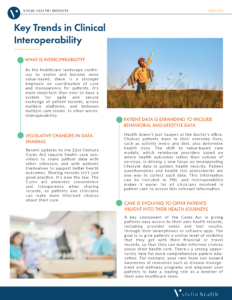Keeping track of patient records has always been an important part of clinical care. Technology has risen to the challenge, making it easier and more secure to track diagnoses, care delivery, and more. In fact, an entire industry has sprung up around Electronic Medical Records (EMRs). With so many players in the field, it’s not surprising that EMR platforms haven’t always worked well together.
What is Interoperability?
As the healthcare landscape continues to evolve and become more value-based, there is a stronger emphasis on coordination of care and transparency for patients. It’s more important than ever to have a system for agile and secure exchange of patient records, across multiple platforms, and between multiple care teams. In other words: interoperability.
Legislative Changes In Data Sharing
Recent updates to the 21st Century Cures Act require health care providers to share patient data with other clinicians and with patients themselves to support better health outcomes. Sharing records isn’t just good practice. It’s now the law. The Cures act promotes convenience and transparency when sharing records, so patients and clinicians can make more informed choices about their care.
Patient Data is Expanding to Include Behavioral and Lifestyle data
Health doesn’t just happen at the doctor’s office. Choices patients make in their everyday lives, such as activity levels and diet, also determine health risks. The shift to value-based care models, which reimburse providers based on whole health outcomes rather than volume of services, is driving a new focus on incorporating lifestyle data in patient health records.
Patient questionnaires and health risk assessments are one way to collect such data. This information can be included in PHI, and interoperability makes it easier for all clinicians involved in patient care to access this relevant information.
Care is Evolving to Offer Patients Insight Into Their Health Journeys
A key component of the Cures Act is giving patients easy access to their own health records, including provider notes and test results, through their smartphones or software apps. The goal is to give patients a similar level of visibility that they get with their financial or travel records, so that they can make informed choices about their health care.
There’s a strong opportunity here for more comprehensive patient education. For example, your care team can expand awareness of resources such as disease management and wellness programs and empower your patients to take a leading role as a member of their own healthcare team.
Practices are Scaling up Their Data Sharing Capabilities
While some larger health systems and hospitals may already have technology in place to facilitate Cures Act requirements, this often isn’t the case for smaller practices. But your care team doesn’t need to develop your own in-house solutions to meet these data-sharing requirements. Practices around the country are partnering with patient data exchange experts.
Vivlio is compliant with the Cures Act, and we serve as the connective tissue between you, your patients, and other care providers. We leverage expert patient data sharing capabilities to make sure you have all the information you need to provide exceptional care. Vivlio will help secure your patient data, and ensure you comply with all Cures Act requirements when it comes to sharing confidential patient information across the care continuum.
Clinical interoperability may seem complex, but it doesn’t have to be. You can easily follow trends in clinical interoperability and make the most of data sharing capabilities. Let’s talk about how we can help support the needs of your practice.




